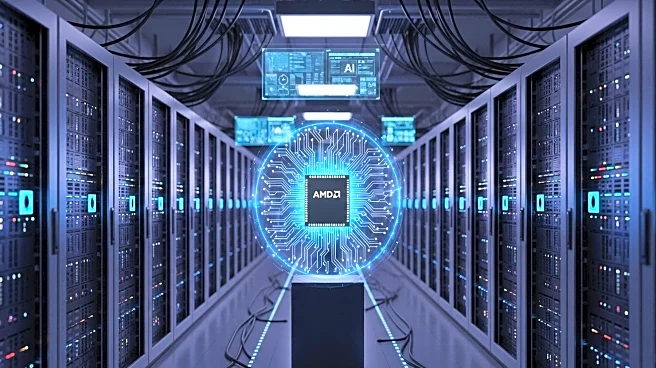What is the story about?
What's Happening?
OpenAI has announced a strategic partnership with AMD, deploying 6 gigawatts of AMD's Instinct graphics processing units to bolster its AI infrastructure. This collaboration includes a warrant for OpenAI to acquire up to 10% of AMD, following OpenAI's previous $100 billion agreement with Nvidia. The partnership highlights the growing consolidation within the AI industry, where major players like Nvidia, Oracle, AMD, and Broadcom are interlinked through capital, equity, and technology exchanges. OpenAI's influence was further demonstrated by a surge in Figma shares after CEO Sam Altman showcased the company's design software during a presentation. The AI sector is increasingly characterized by a circular economy, raising concerns about potential vulnerabilities if any component of this interconnected system falters.
Why It's Important?
The partnership between OpenAI and AMD signifies a pivotal moment in the AI industry, underscoring the concentration of power among a few key companies. This consolidation could lead to increased efficiency and innovation but also poses risks of monopolistic behavior and reduced competition. The reliance on a tightly knit network of companies for AI development and deployment may create vulnerabilities, as any disruption in one part of the network could have widespread consequences. Stakeholders in the AI industry, including investors, developers, and policymakers, must navigate these dynamics carefully to ensure sustainable growth and equitable access to AI technologies.
What's Next?
As the AI industry continues to evolve, stakeholders will likely monitor the stability and performance of this interconnected network closely. Potential regulatory scrutiny may arise to address concerns about monopolistic practices and ensure fair competition. Companies involved in the AI sector may seek to diversify their partnerships and investments to mitigate risks associated with over-reliance on a few key players. Additionally, advancements in AI technology and infrastructure could lead to new opportunities for innovation and expansion, influencing the broader tech landscape.
Beyond the Headlines
The consolidation within the AI industry raises ethical and cultural questions about the concentration of technological power and its implications for society. As AI technologies become more integrated into daily life, issues related to privacy, data security, and algorithmic bias may gain prominence. The industry's focus on a few major players could also impact the diversity of perspectives and solutions available, potentially stifling innovation and limiting the benefits of AI advancements to a select group.

















